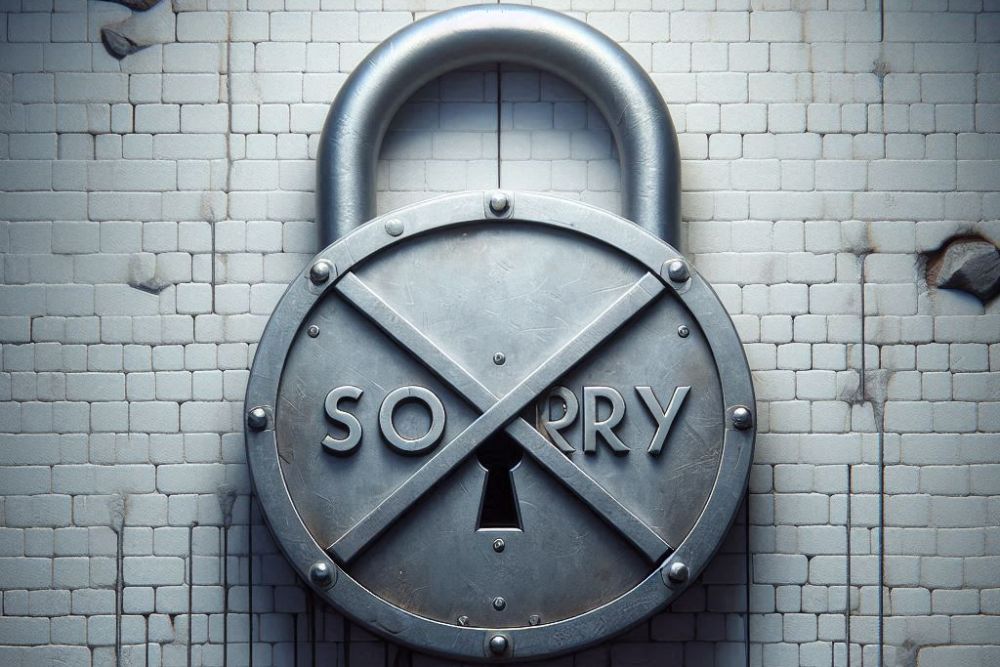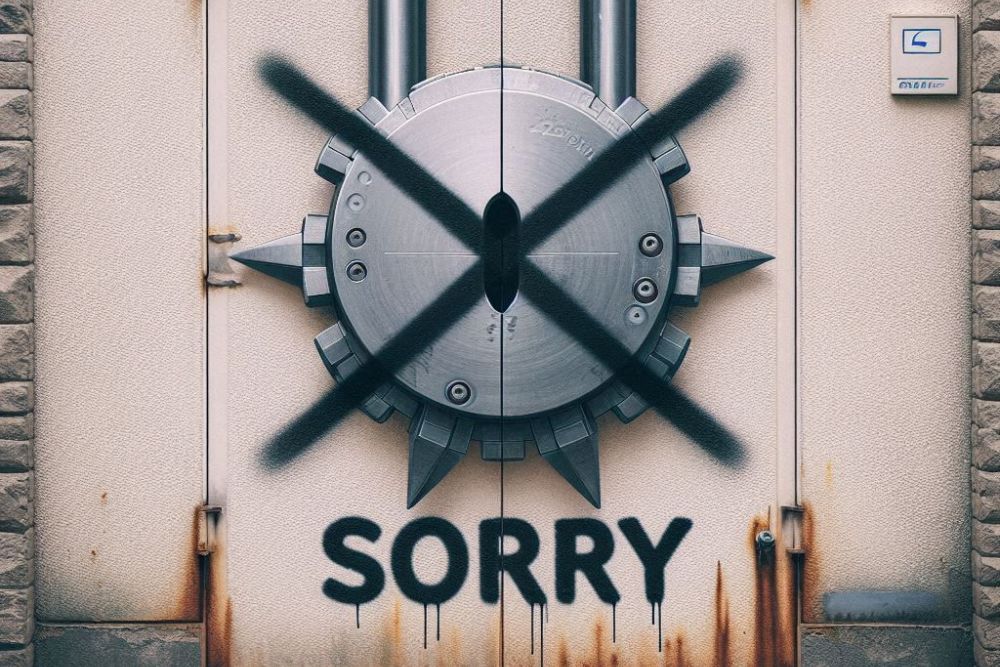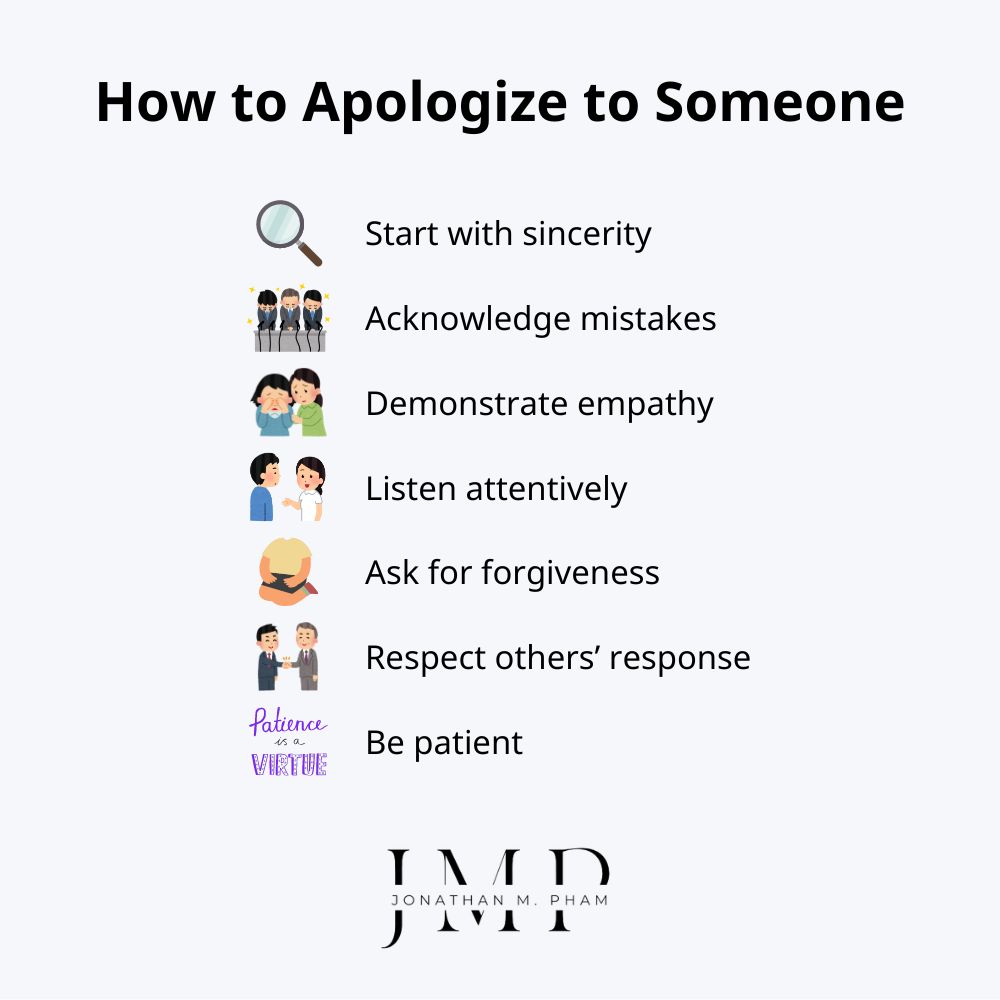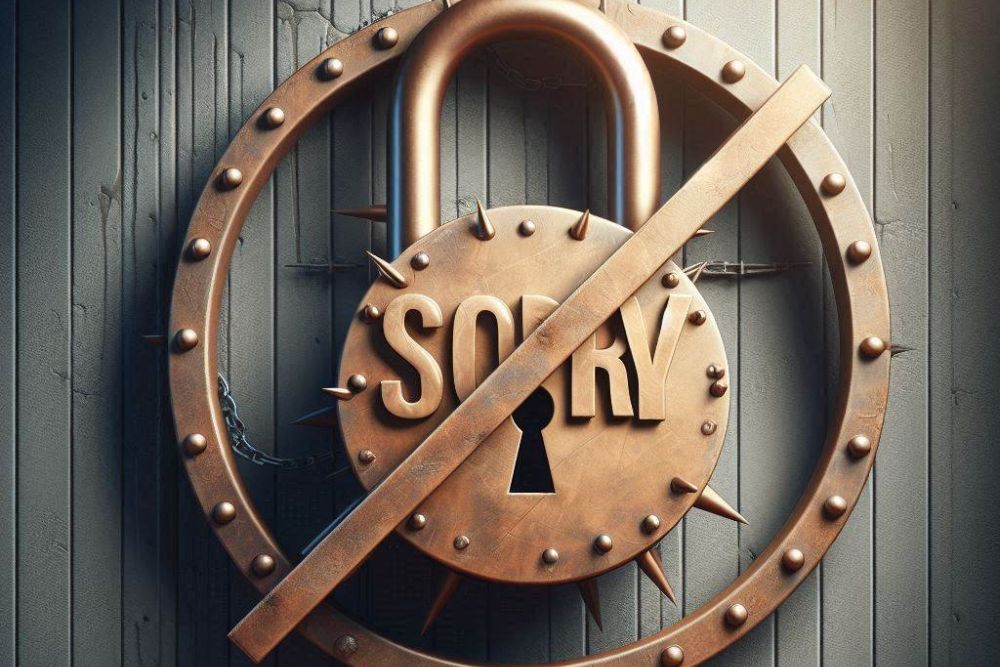Discover the impact of refusing to apologize, why we resist saying sorry, and learn how to break free from this damaging habit.
Apologies play a crucial role in maintaining harmony and meaningful connections. Yet, we often find ourselves hesitating to utter the two simple words, “I’m sorry.” Refusing to apologize is a common bad habit that leaves significant repercussions on our relationships and personal growth; hence, it is crucial that those who aspire to reach greater heights in their professional journey learn how to get rid of it.
Highlights
- Refusing to apologize takes many forms, from denial and blame-shifting to minimizing an action’s impact and offering insincere apologies. The reasons for this bad habit are complex – ranging from self-centeredness and fear of shame to skepticism about reconciliation and difficulty expressing remorse.
- When we frequently hesitate to say sorry to others, it damages relationships, escalates conflicts, hurts our reputation, and hinders personal and professional growth.
- Despite its power to heal and strengthen relationships, apologizing is often difficult due to our fear of being perceived as weak, loss of control, and past experiences. That said, a sincere “I’m sorry” will dissolve these fears. It can be compared to the phrase “I love you” in that it holds immense power to heal past wounds, prompt forgiveness, and open doors to stronger relationships.
- To deliver a sincere apology, you need to acknowledge your past mistakes, express empathy, and offer amends for your wrongdoings. Even if your apology is initially rejected, just stay calm, be respectful, and do whatever is necessary to show your commitment to healing the relationship.
- A sincere apology is just the beginning; true amends involve taking action to rebuild trust and attain lasting behavior change.
- On the other hand, when someone else refuses to apologize to you, you should consider setting boundaries, expressing your feelings, prioritizing self-care, and letting it go for your own peace of mind.
What Does Refusing to Apologize Mean?
We all know of those who constantly fail to acknowledge their wrongdoings or hurtful actions toward others. This reluctance to admit fault/ take responsibility is what strains their relationships and impedes personal growth.
Refusing to apologize manifests itself in various ways, some of which include:
- Denying responsibility: People who are subjected to this detrimental habit may adamantly deny any wrongdoing – even when presented with clear evidence or witness accounts that validate their actions.
- Blaming others or circumstances: Instead of owning up to their actions, they may shift blame onto others or external factors as a way to avoid accountability. By doing so, they evade the need to confront the consequences of their behavior.
- Making excuses or justifications: Haunted by reasons such as a fragile ego or weak sense of self, these non-apologists attempt to rationalize their hurtful actions rather than genuinely acknowledging their impact on others – by offering explanations such as being stressed, tired, or provoked.
- Minimizing/ dismissing impact: They downplay the consequences of their actions on others – some may even label those hurt by their arrogance as overreacting, too sensitive, or exaggerating the situation.
- Avoiding confrontation: When confronted about their behavior or asked for an apology, they change the subject or evade the conversation altogether, avoiding the uncomfortable truth of their actions.
- Criticizing others’ feelings or opinions: Instead of showing empathy or understanding, some individuals may resort to attacking or criticizing the other person for their feelings, opinions, or actions, further deepening the rift between them.
- Offering unauthentic apologies: People who refuse to apologize may resort to insincere phrases like “I’m sorry you feel that way” or “I’m sorry if I offended you” – effectively deflecting responsibility onto others’ emotions rather than addressing their own actions.
- Expecting unearned forgiveness: Some might expect others to forgive them without expressing genuine regret or showing any intention to change their behavior, disregarding the need for accountability.
- Holding grudges: Those refusing to apologize might hold grudges against the other person for not accepting their non-apology or for raising the issue again, perpetuating the conflict and hindering reconciliation.
- Ignoring the issue: They pretend that nothing happened – or that everything is fine without addressing or resolving the conflict.

Sample responses of people who refuse to apologize:
- “I’m not sorry, I was right.” This response reflects a stubborn refusal to admit wrongdoing, as the individual believes their actions were justified and sees no reason to apologize.
- “I’m sorry if you were offended, but I didn’t mean to.” This is an example of a half-hearted apology that doesn’t truly acknowledge the hurt caused. The person indirectly accepts the other person’s feelings – but doesn’t admit responsibility for their actions.
- “I’m sorry, but you’re too sensitive.” Such a reply places blame on others for being offended, implying that the issue lies with the individual’s perceived overreaction rather than the actual hurtful actions.
- “I’m not going to apologize for being me.” This response indicates a steadfast refusal to change harmful behavior, using the excuse that their actions are inherent to their personality, and therefore, they don’t feel the need to apologize for their treatment of others.
Why Do We Refuse to Apologize?
The reasons behind our reluctance to apologize are really complex and multifaceted – influenced by various factors such as our personality, the specific situation at hand, and the dynamics of our relationships:
- Lack of concern: Some people with high levels of narcissism may lack empathy and view relationships solely as a means to fulfill their own needs. As a result, they may not care enough about the other person’s feelings or the relationship itself to bother with the emotional discomfort of apologizing.
- Threat to self-image: For some, saying sorry is perceived as a threat to their self-image and ego. Their desire to win at all costs drives them to fear that apologizing will lead to feelings of shame or a sense of being a “bad” person, blurring the distinction between their actions and their character. As a result, they resort to self-defense instead.
- Unwillingness to make amends: Apologizing is often the first step towards making amends for the harm caused. That said, many lack the desire to reconcile – or may simply not care about the consequences of their actions on others.
- Denial: In certain cases, people may genuinely believe they have done nothing wrong and, therefore, see no reason to apologize. This is particularly evident in those who possess rigid notions of right and wrong – or harbor a self-righteous mindset.
- Skepticism: Many may doubt that apologizing will help repair the damage caused – or that their apology will be accepted. Past experiences of rejection or betrayal may lead them to hold low expectations for the relationship’s future.
- Fear of emotional vulnerability: For individuals with attachment issues or insecure attachment styles, apologizing may trigger fears of emotional closeness and vulnerability. As a result, they may be more comfortable with emotional distance and anger, while avoiding intimacy and dependence on others.
- Difficulty expressing regret: Some people may genuinely want to apologize but struggle with effectively expressing their regret and remorse in a sincere manner. This could be attributed to a lack of social skills/ emotional intelligence/ a lack of exposure to healthy apology models.
- Worry about being judged: The fear of others passing judgment is what deters many from apologizing. They may worry that admitting fault will be perceived as a sign of weakness – or an inability to manage their emotions effectively.
Read more: The Excessive Need to Be Me – When the Ego Takes Over

Why do people resist apologizing
Consequences of Not Apologizing
The consequences of refusing to apologize extend far beyond a mere exchange of words, reaching into the core of our relationships, self-esteem, and overall well-being. By disregarding the opportunity to offer a genuine apology, we open ourselves up to several serious repercussions:
- Damage to relationships: Failing to apologize leaves others feeling disregarded, unimportant, and uncared for. This erosion of trust and emotional safety leads to distance, distrust, and resentment within our personal and professional relationships.
- Escalation of conflict: The aggrieved party may seek retaliation or retribution – over time, this tit-for-tat cycle of conflict may intensify and become challenging to break, perpetuating negativity and animosity.
- Tarnished reputation: Not apologizing is often perceived as arrogance, stubbornness, or insensitivity, potentially altering how others view and interact with us in future relationships. It may diminish respect, credibility, and social standing, impacting both personal and professional spheres.
- Negative impact on well-being: Unresolved conflicts and tension can lead to increased stress and anxiety, potentially resulting in long-term stress and unhappiness. What’s more, feelings of guilt and shame may further contribute to emotional distress.
- Impediment to growth: In the professional realm, being perceived as someone who avoids responsibility for mistakes can undermine trust and collaborative opportunities with colleagues.
- Loss of self-respect: Failure to say sorry can leave us feeling conflicted, guilty, or ashamed. It prevents us from acknowledging our mistakes, taking responsibility, and growing.
- Missed opportunities: A sincere apology provides an opportunity for introspection and growth. By refusing to apologize, we miss valuable chances to learn from our mistakes and become more compassionate.
The Dilemma of Refusing to Apologize
(This section – alongside the next two parts – is compiled with inspiration drawn from #Habit 15 in Dr. Marshall Goldsmith‘s bestseller ‘What got you here won’t get you there‘, which was written based on his years of experience coaching executives from various organizations)
Apologizing is akin to a cleansing ritual, to a confession in a place of worship. We are all aware of how the words “I’m sorry” help bring about solace and resolution – and yet, despite its apparent simplicity, many of us find it challenging to do so. There are various factors that contribute to this dilemma surrounding apologies.
Some may view apologizing as a sign of weakness – this is particularly evident among those who have a relentless drive to succeed in every endeavor. Admitting wrongdoing can be difficult, especially when we are accustomed to being right most of the time. Seeking forgiveness may even be seen as an act of humiliation, possibly suggesting a sense of subservience.
Another consideration is the perceived loss of power or control that comes with an apology, prompting many to resist taking responsibility for their actions.
However, the irony lies in the fact that the very fears that deter us from apologizing are actually – and can be swiftly dissolved with a genuine “I’m sorry”. In saying such words, we foster connection and transform those around us into allies and partners, shattering the barriers that hinder harmonious relationships.
Reflecting on past experiences, you may realize that the refusal to express regret has been a common cause of fraying relationships, both in personal and professional spheres. The bitterness stemming from an unapologetic act can persist for extended periods, damaging bonds that once thrived.
We must learn to appreciate that refusing to apologize is as detrimental as any other interpersonal flaw. By mustering the courage to say sorry for our wrongdoings, we extend an olive branch, paving the way for reconciliation and strengthening the very bonds that might otherwise fray.
People who can’t apologize at work may as well be wearing a T-shirt that says, “I don’t care about you.”
Marshall Goldsmith

Refusing to apologize is a weakness, not a strength
You Reap What You Sow
If you smile at people, they will smile back. If you ignore them, they will resent you. If you put your fate in their hands – i.e., cede power to them – they will reward you.
Marshall Goldsmith
Dr. Goldsmith once shared a story about him dining at the elegant Le Perigord, a renowned French restaurant in New York City as follows:
I had never been to a restaurant like this, where the flower arrangements required separate tables, the cutlery had the heft of an ax, and the waiters were dressed in black tie and sported impenetrable French accents. I confessed to the waiter that I was intimidated by the surroundings, that I only had one hundred dollars, tip included, to spend on the meal, and that I couldn’t read the menu, which was hand-written in French.
“Would you please bring me the best one-hundred-dollar meal you have,” I asked.
I am convinced that the meal I was served that night – not only the extra courses, the cheese tray, and the constant refills of my wine glass, but also the ridiculously solicitous service – was worth at least 50% more than my hundred-dollar budget. I admitted I was a rube, and the staff responded by treating me like the Sun King.
This experience instilled in me the conviction that if you put all your cards in someone else’s hands, that person will treat you better than if you kept the cards to yourself.
As you may see from the story above, when we place faith in others, they will respond with kindness and generosity.
This principle reflects the interconnectedness of our actions and the responses they elicit from those around us.
Whether in personal relationships or professional endeavors, acknowledging the interplay between our deeds and the reactions they evoke will guide us toward more harmonious and rewarding interactions. By sowing seeds of trust, respect, and goodwill, we are more likely to reap a bountiful harvest of positive outcomes and enriched connections with others.
To gain a friend, let him do you a favor.
Benjamin Franklin
The Transformative Power of Apologies
Apologies possess an extraordinary and profound impact, resonating deeply in the human psyche, much like a heartfelt declaration of love. They are akin to an inversion of “I love you”. While love expresses care and joy, an apology conveys remorse and acknowledgment of having caused hurt. Both gestures are equally seductive and compelling, transforming relationships between individuals in irrevocable ways and propelling them towards new, potentially wonderful, horizons together.
One of the most compelling aspects of saying sorry is that it prompts people to let go and stop living in the past. By expressing regret, one acknowledges their inability to alter history. Instead, they admit their wrongdoing, demonstrate remorse for the pain inflicted, and pledge to improve moving forward.
This combination of an admission of guilt, a sincere apology, and a plea for guidance resonate profoundly – even with those who may seem cold-hearted. The power of this approach can be alchemical when applied in the workplace, significantly impacting how coworkers perceive and regard one another.
Dr. Goldsmith once shared the example of one of his coaching clients as follows:
My client Beth was the highest-ranking woman at a Fortune 100 company. Her bosses loved her. So did her direct reports. By contrast she was loathed by some of her peers. When I surveyed her coworkers I learned that she had a particularly toxic relationship with a hard-boiled division chief named Harvey. Beth was a smart, know-it-all young hotshot brought in by the CEO to stir things up. Harvey, however, saw her as arrogant and felt she didn’t respect the company’s history and traditions. The two of them were in a perpetual turf war, and it brought out the worst side of her personality: Her mean, vindictive streak. We agreed that this is the behavior she would change.
The first thing I had Beth do was apologize—to Harvey. I could see her bristle at the suggestion. I told her, “If you can’t do this, you can’t get better. And by the way, I’m outta here. I can’t help you.” The thought of yielding to Harvey was so distasteful to her that I actually scripted out the apology. I didn’t want any misgivings or hesitations to creep in and pollute the apology (which would destroy the effect). To Beth’s credit she followed the script.
She said, “You know, Harvey, I’ve got a lot of feedback here and the first thing I want to say is that I’m positive about a lot of it. The next thing I want to say is that there are some things at which I want to be better. I’ve been disrespectful to you, the company, and the traditions in the company. Please accept my apologies. There is no excuse for this behavior and . . .”
Harvey cut her off before she could finish her apology. She looked at him with alarm, poised for another fight, until she noticed that he had tears in his eyes. The first thing he said was, “You know, Beth, it’s not just you. It’s me. I have not been a gentleman in the way I’ve treated you. I know that this was hard for you to tell me these things and they are not all your problems. This is my problem, too. We can get better together.”
When one seeks growth and improvement, it inspires reciprocity, with others endeavoring to better themselves too. This process of personal and collective transformation permeates various levels of human interaction, from individuals and teams to divisions and entire companies. As individuals strive for improvement, the cumulative effect elevates teams, fosters growth, and propels organizations toward success.
In this way, the genuine act of apologizing acts as a catalyst for positive change – elevating relationships, and fostering a culture of mutual support and development within organizations. By recognizing the transformative potential of apologies, individuals and teams can forge a path toward collective growth and become a formidable force in their respective domains.
Read more: Law of Attraction – Tips for Manifesting Abundance and Success in Life
How to Apologize to Someone
Now that we are aware of the consequences of refusing to apologize, it’s time to start taking action to resolve things.
Apologizing to someone we have hurt is a powerful act of humility and accountability – demonstrating respect, empathy, and genuine remorse for our actions. A heartfelt apology has the potential to mend wounds, rebuild trust, and foster renewed harmony in one’s relationships.
To offer an effective apology to someone you hurt deeply, consider following these essential steps:
Start with sincerity
Begin with a straightforward and heartfelt “I’m sorry.” These simple words carry significant weight and convey your willingness to take responsibility for your actions. Under all circumstances, refrain from phrases like “I’m sorry, but …” or “I’m sorry if …,” as they signal an unauthentic or feeble attempt to deflect blame.
Acknowledge your wrongdoing
Be specific and honest about the actions that caused harm and why they were wrong. Do not justify, minimize, or deny your mistake – instead, openly acknowledge the consequences of your actions, and how they hurt or affected the other person.
Demonstrate empathy
Express genuine regret and remorse for the pain you caused. It is recommended that you make use of empathic language to illustrate your willingness to understand others’ feelings, such as “I can imagine how you felt” or “I know this must have been hard for you.”
Listen attentively
Give the other person the space to express their feelings and needs without interruption, argument, or justification. Actively listen and strive to acknowledge their perspectives – plus the impact of your actions. For instance, you can say, “I hear you. I can see how much I hurt you by doing that.”
Ask for forgiveness & offer amends
Do not be afraid of requesting forgiveness and expressing commitment to improving in the future. Offer to make amends in a concrete way, showing that you are willing to take corrective action. For instance, you can say, “Please forgive me for what I did. I will never do it again. Is there anything I can do to make it up to you?”
Respect others’ response
People may respond differently to your apology – they may accept/ reject/ need time to think about it. Regardless of their reaction, respect their decision and avoid pressuring them to forgive or forget.
Exercise patience
Forgiveness takes time. For the healing process to truly take effect, be patient and understanding, consistently demonstrating that you genuinely regret your actions.

Below is an example of an apology following the guidelines above:
“I’m so sorry for what I said to you yesterday. I realize now that I was completely out of line, and my words were hurtful. I was feeling stressed and frustrated, but that’s no excuse for how I treated you. I want to express my deepest regret and apologize from the bottom of my heart.
I understand that my words may have caused significant pain, and I can’t take back what I said. However, I want you to know that I’m here for you if you need to talk or if there’s anything I can do to make things right.
I genuinely hope you can find it in your heart to forgive me. I promise that I will learn from this mistake and never utter anything hurtful like that again.”
While apologizing may be challenging, it is a rewarding and transformative endeavor. Embracing the responsibility of making amends can facilitate personal growth, encourage learning from mistakes, and foster reconciliation within our relationships.
Read more: Healing Your Inner Child – 15 Steps to Unearthing the Happy, Healthy You Within
When Your Apology is Not Accepted
Navigating the aftermath of an unaccepted apology requires emotional maturity, empathy, and humility. While the experience may be challenging, such moments also present opportunities for self-reflection, understanding, and growth.
Here are some valuable tips to navigate such a circumstance:
- Maintain calmness and respect: Avoid letting your emotions dictate your response – in other words, refrain from becoming angry, defensive, or sarcastic. Instead, approach the situation with composure and respect for the other person’s feelings and decisions, even if you disagree with them.
- Acknowledge their feelings: Let people know that you recognize their hurt and sincerely accept their choice not to accept your apology. Demonstrating empathy really helps with building up the necessary space for open communication and understanding.
- Offer a second one: Sometimes, the initial expression of regret may not fully convey your sincerity or remorse. If that’s the case, consider doing it again, using more specific and empathetic language. For example, “I’m truly sorry for what I did. I deeply regret hurting you, and I understand your feelings. I don’t blame you for being upset with me.”
- Seek ways to make amends: Apologies gain strength through action. Inquire about what the other person needs or expects from you to facilitate healing in the situation. Following through on your promises will help show your commitment to making things right.
- Propose a time to talk later: If they are not ready to discuss the matter immediately, offer to talk at a later time when they feel more composed. Respect their need for space – so as to showcase your consideration and willingness to address the issue.
- Allow time and space: Forgiveness may not come instantaneously – often, people require time to process their emotions and contemplate your apology. Be patient and avoid pressuring or harassing them. Assure them that you will wait and support their pace.
- Be patient: If your apology remains unaccepted after some time, do not give up. Continue to demonstrate your genuine remorse and willingness to mend the situation.

Refusing to apologize
Saying Sorry is not Enough: How to Make Amends
While apologizing is an essential first step towards reconciliation, it alone does not suffice when we have hurt someone or acted inappropriately. To truly make amends, we must take concrete actions to repair the damage and restore the trust that may have been compromised.
A meaningful apology should be accompanied by tangible behavioral and attitudinal adjustments. Avoid reverting to old patterns and show your dedication to making lasting changes. For example, if you did something dishonest before, do your best to demonstrate increased honesty and transparency in your interactions moving forward.
Remember, the process of making amends is not a one-time effort – it is an ongoing commitment to positive change and understanding. Patience, humility, and a sincere desire for personal growth are required for one to sustainably tread the path to restoring relationships – and fostering more compassionate connections with others.
When Someone Won’t Apologize for Hurting You
When someone refuses to apologize for hurting you, the emotional impact can be significant, leaving you feeling hurt, angry, and even betrayed. Coping with this situation and finding a way to move forward is certainly challenging – that said, there are constructive steps you can take to navigate this emotionally taxing experience:
- Set healthy boundaries: Consider establishing boundaries that limit your contact with the person or, if necessary, ending the relationship altogether. Communicate your feelings and expectations clearly, expressing that their actions have hurt and disrespected you – and that you require acknowledgment and an apology. For example: “I feel hurt and disrespected by what you did, and I need you to apologize and show me that you care about me.”
- Seek understanding: Sometimes, people may not realize the extent of the hurt they caused – or they may have a different perspective on the situation. If appropriate, ask for an explanation to understand their side of the story with an open mind. Listening to their viewpoint may offer insights into their intentions or feelings. For instance, you can say, “Can you please tell me why you did that? I want to understand your point of view.”
- Express your emotions: Acknowledge your feelings and needs without suppressing or pretending everything is fine. Use “I” statements to avoid blaming or accusing them directly. Let them know that you feel hurt and angry – and that you need an apology to heal and move forward.
- Avoid begging or forcing an apology: While receiving an apology may be meaningful to you, begging or forcing someone to express regret for their wrongdoings is not genuine – and may not lead to the desired resolution.
- Focus on self-care: Refrain from allowing the other person’s insolence to impact your self-esteem or happiness. Concentrate on yourself and engage in activities that promote well-being. Practice self-care and self-compassion, seeking support from those who care about you and understand your feelings (e.g. friends, family, or a counselor if needed). If you made any mistakes or contributed to the conflict, forgive yourself and use the experience as an opportunity for personal growth.
- Think about forgiving them: Forgiveness is a personal decision that only you can make. It does not mean condoning or forgetting what the other person did – but rather releasing resentment and anger for your own well-being. Choosing to let it go is a powerful way to heal and move on from the situation, enabling you to free yourself from the emotional burden.
Life becomes easier when you learn to accept an apology you never got.
Robert Brault
Refusing to Apologize Quotes
In this life, when you deny someone an apology, you will remember it at time you beg forgiveness.
Toba Beta
Never ruin an apology with an excuse.
Benjamin Franklin
Sincere apologies are for those that make them, not for those to whom they are made.
Kelsey Frizzell

Refusing to apologize
Final Thoughts
Refusing to apologize is a bad habit that has far-reaching consequences in our interpersonal relationships and personal growth. It impedes the resolution of conflicts, distances us from those we care about, and inhibits our capacity for self-improvement. However, by acknowledging the impact of our actions and seeking reconciliation, we not only repair our relationships – but also embark on a journey of personal growth, compassion, and ultimately, a more harmonious and fulfilling life.
Other resources you might be interested in:
- Taking Credit for Others’ Work: A Detrimental Habit
- Not Saying Thank You: Why Do We Often Fail to Express Gratitude?
- Not Listening: The Silent Killer of Relationships and Success in Life
- Playing Favorites: The Dark Side of Leadership
Let’s Tread the Path Together, Shall We?


